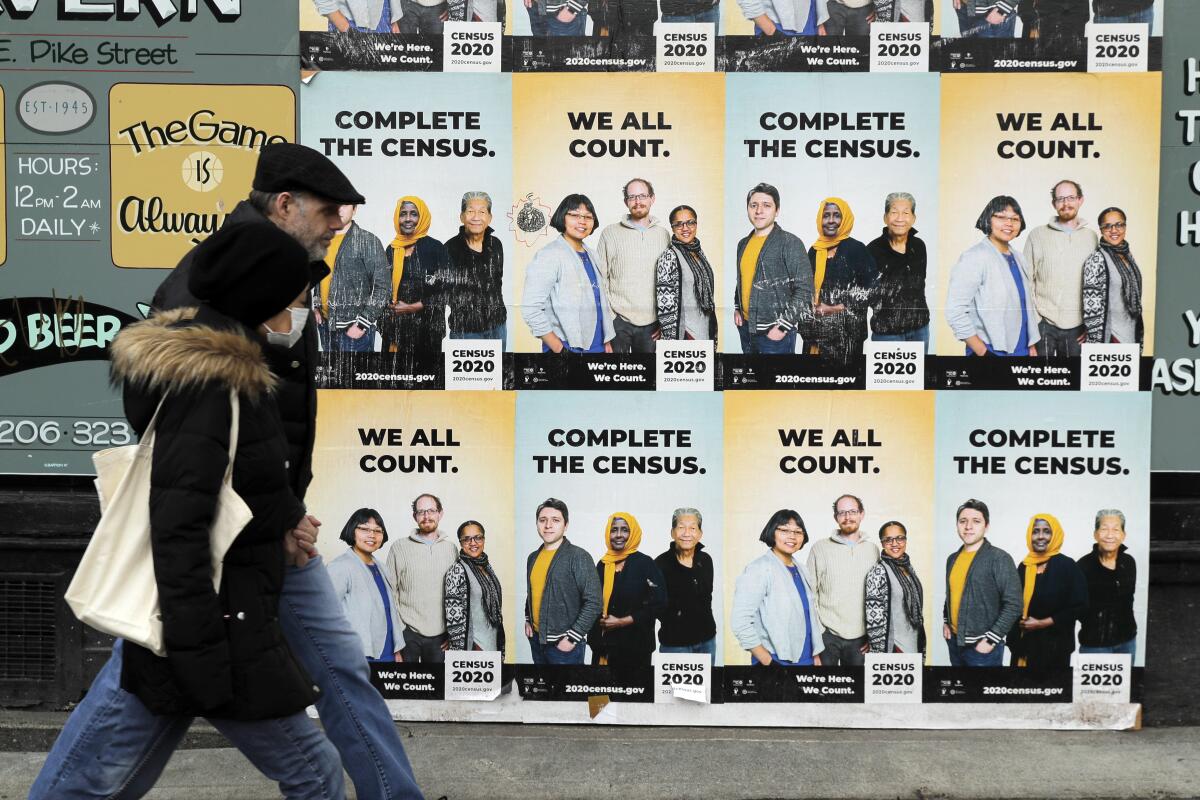Why every person, regardless of citizenship, counts in apportioning House seats

- Share via
The Supreme Court recently decided to hear Trump vs. New York, a case challenging the Trump administration’s decision to exclude undocumented immigrants from the 2020 census counts that would be used in apportioning House seats.
There are important issues on which the Constitution is vague. But not in this case. The constitutional text is clear and the Trump administration’s position is wrong.
The Constitution, in Article I, Section 2, mandates that “Representatives … shall be apportioned among the several States … according to their respective Numbers, which shall be determined by adding to the whole number of free Persons, … and excluding Indians not taxed, three fifths of all other Persons.”
The word “persons” is often used in the Constitution to refer to all people, as opposed to only citizens. When a constitutional provision applies only to citizens, it uses that very word, as in the Privileges and Immunities Clause, which prevents states from denying various rights to “citizens” of other states but not noncitizens.
Moreover, if the term “free persons” were limited to citizens, there would have been no need for the exclusion of “Indians not taxed,” a phrase primarily denoting Native Americans living under the authority of tribal governments. Such persons were not citizens at the time of the founding and indeed did not become citizens until Congress passed a law to that effect in 1924.
There is even less support for the idea that “persons” is somehow defined by immigration status. Many of the founders, including James Madison and Thomas Jefferson, held the view that the original meaning of the Constitution did not give the federal government any general power to restrict immigration. With the exception of the abortive Alien Act of 1798, which was widely considered unconstitutional, there was very little in the way of federal immigration restrictions during the first century of American history. The category of undocumented migrants was essentially nonexistent under federal law at the time of the founding.
Long-standing practice fully supports this textual reading of the Constitution. Apportionment counts from every census since the very first one in 1790 have included immigrants, without regard to citizenship or migration status.
The Trump administration, however, claims the Constitution allows the president broad discretion to determine who counts as a person living in a particular state. But nothing in the Constitution gives him any such discretion. Such power could be easily abused by a president intent on increasing the proportion of seats allocated to states that support his party.
The Constitution forbids excluding undocumented migrants from apportionment counts. And doing so would be a difficult and imprecise task, given limitations of available data.
It might seem strange that congressional apportionment includes noncitizens who cannot vote. But large numbers of nonvoters have always been included in apportionment counts. At the time of the founding, and for generations afterward, most state governments denied the franchise to women and to many men who failed to meet property qualifications. Yet both groups were counted for apportionment.
The odious provision of the Constitution that counted an enslaved person as three-fifths of a free person for apportionment purposes gave extra representation to slave states, even though slaves were denied both citizenship and the franchise. And even today, most states deny the vote to children under 18, many convicted felons and some of the mentally ill. Yet all these groups still count.
The problem of nonvoters being “represented” by politicians elected by others is partly mitigated by the fact that the interests and sympathies of voters and nonvoters are often intertwined. Thus many adults are sympathetic to the interests of children, and many voters in states with large populations of noncitizens are supportive of undocumented immigrants, sometimes to the extent of establishing “sanctuary” jurisdictions to protect them.
Still, if there were a need to reduce the disjunction between apportionment counts and voting populations — at least when it comes to immigrants — the way to do that is to make legal immigration easier (reducing incentives for illegal migration) and to give undocumented migrants a path to citizen status. But we should not pursue that goal by violating the Constitution.
Ilya Somin is a professor of law at George Mason University and author of “Free to Move: Foot Voting, Migration, and Political Freedom.”
More to Read
A cure for the common opinion
Get thought-provoking perspectives with our weekly newsletter.
You may occasionally receive promotional content from the Los Angeles Times.









